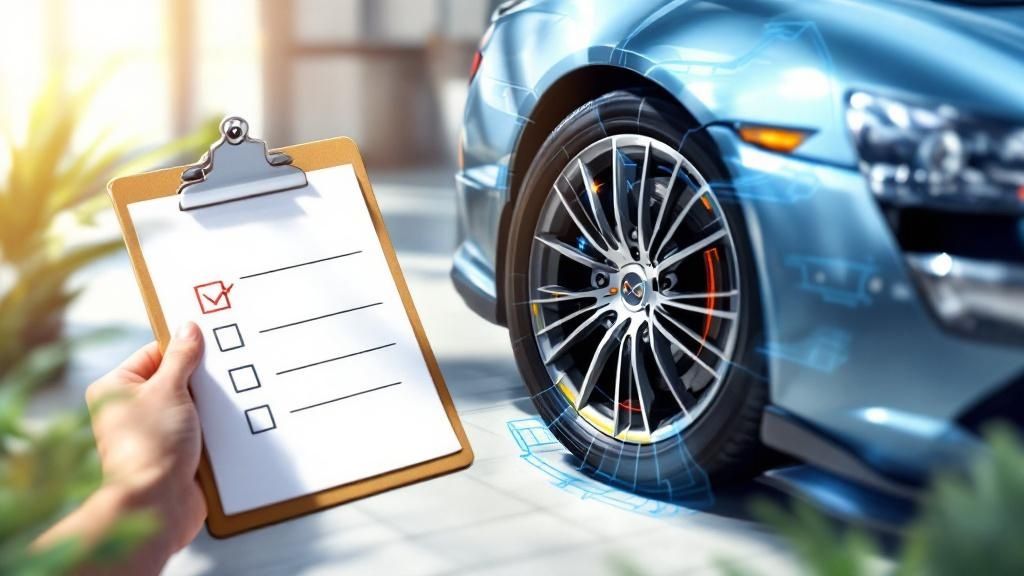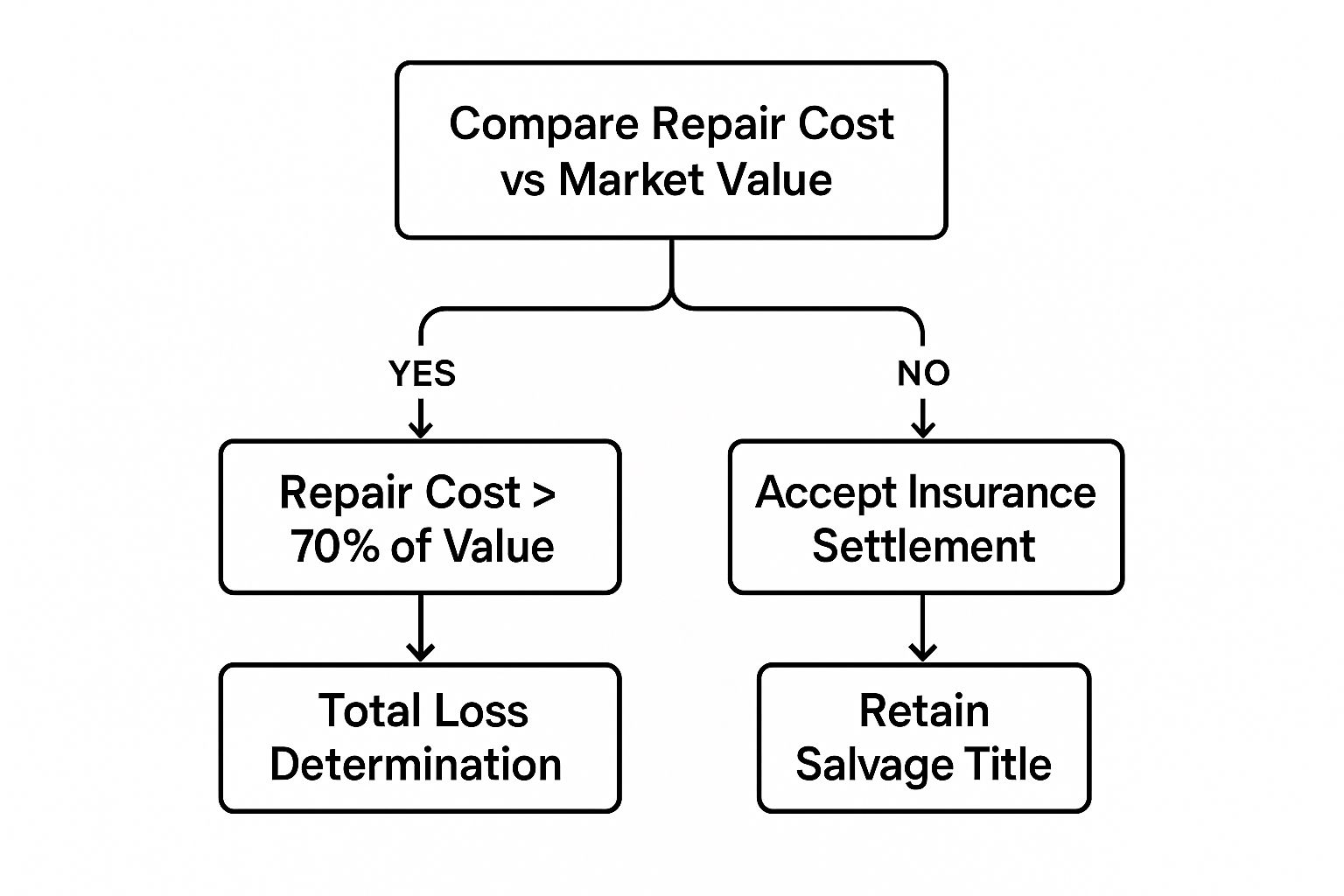When your car is declared a total loss, the first offer you get from the insurance company can feel like a final, non-negotiable number. But here’s a secret from someone who has been in the trenches: that first offer is almost always just their opening bid. It's a number often spit out by a computer, and it rarely reflects what your car was actually worth.
Why Your Insurer's Offer Is Just a Starting Point

Let's be clear: your insurance company's goal is to close your claim quickly and for the lowest possible cost. It's just business. To do that, they lean heavily on valuation software—you'll hear names like CCC ONE or Audatex. These programs scan huge national databases to calculate your car's Actual Cash Value (ACV).
The problem is, these automated reports have some serious blind spots. They're great at crunching generic data, but they completely miss the little things that made your car special and valuable.
The Problem with Cookie-Cutter Valuations
Think about it this way: a software program can't physically see your car. It just sees a list of data points. It has no idea you just dropped $1,200 on a brand-new set of Michelin tires last month. It also doesn't know your car was meticulously garage-kept and in showroom condition, unlike most other vehicles of the same year.
These systems consistently fail to account for real-world factors like:
- Recent Upgrades: That new sound system, recent engine work, or even those premium floor mats you bought.
- Superior Condition: A car with flawless paint and a pristine interior is worth significantly more than one with dings, dents, and stained seats. An algorithm often struggles to tell the difference.
- Local Market Fluctuations: Your specific make and model might be a hot seller in your city, driving its value well above the national average the software uses.
This is exactly why you need an independent appraiser. A real person performs a detailed, hands-on inspection to build a case for your vehicle's true, fair market value.
Market Realities Can Work Against You (And For You)
The car market has been on a wild ride recently. Soaring prices for both new and used vehicles, driven by inflation and supply chain headaches, have a direct impact on total loss claims.
Ironically, newer cars are often totaled out more easily now. Why? Because the complex tech inside them, like Advanced Driver Assistance Systems (ADAS), makes repairs incredibly expensive. The repair bill can quickly surpass even the car's inflated market value.
An insurance policy is a contract that protects both you and the insurer. It has provisions built in to protect you from a lowball offer, but you have to be the one to activate them.
This brings us to the appraisal clause. It's a powerful tool hidden in most auto policies that gives you the right to challenge the insurance company's valuation by hiring your own expert. You can learn more about how to use the appraisal clause in your auto insurance in our detailed guide.
When an independent appraiser invokes this clause for you, it forces the insurer to come to the table and negotiate based on real-world evidence—not just their software's initial low estimate.
How to Find a Qualified Appraiser in Your Area
When you start searching for a "total loss appraisal near me," you're going to get hit with a wall of results. It’s a mix of big national companies, local one-person shops, and a few services that don’t even really handle total loss claims. The trick isn't just to find an appraiser; it's to find the right one—a seasoned pro who can build an airtight case for your car’s actual value.
Instead of just sifting through endless search results, you need to go where the real experts are found.
Look Beyond a Basic Search
Your best bet is to start with organizations that actually vet their members. These groups usually have tough standards for certification and experience, which weeds out the rookies from the pros.
Here’s where I always tell people to look first:
- Professional Appraisal Associations: Start with directories from groups like the American Society of Appraisers (ASA) or the International Automotive Appraisers Association (IAAA). Their member lists are a goldmine of certified professionals.
- Specialized Networks: Some firms are built from the ground up to handle only total loss and diminished value claims. They often have a network of appraisers who are intimately familiar with insurance company tactics.
- High-End Local Auto Body Shops: This is an insider tip. A reputable collision center in your town is an incredible resource. They see appraisers and insurance adjusters every single day and know exactly who is good and who to avoid. Give one a call.
Vet Their Credentials and Experience
Once you have a shortlist of potential appraisers, it’s time to dig in and verify their expertise. Let me be clear: not all certifications are the same. You need someone who lives and breathes total loss claims, not a generalist who appraises classic cars for weekend auctions.
An appraiser's true skill isn't just knowing cars—it's knowing how to methodically pick apart the insurance company's flawed valuation report. They need to speak the insurer's language and back it up with evidence that's undeniable.
Look for a professional who can walk you through their process. A crucial part of this is showing you how much your totaled car is worth by using recent, local market data, not just generic national averages. Their ability to pinpoint hyper-local comparable sales is the single most important factor that will make or break your claim.
Finally, don't forget about word-of-mouth from people who care. Jump into local car club forums or Facebook groups for your specific make and model. The members there are often passionate about their vehicles and can point you to an appraiser who truly gets the value of a well-maintained or uniquely modified car. This kind of inside knowledge is often the fastest way to find the best total loss appraisal near me.
Vetting Appraisers with the Right Questions
You've got a shortlist of potential appraisers. Great. Now for the most critical part: the interview. This isn't just a quick phone call; it's your opportunity to figure out if you're talking to a true professional or just another service provider.
Remember, you’re not just hiring someone to crunch numbers. When you're looking for a total loss appraisal, you're hiring an advocate—an expert witness who will go to bat for you against an insurance company that handles thousands of these claims a year. You need someone who is confident, articulate, and ready to defend their work.
Digging into Their Experience
Start with their direct experience, especially with cars like yours. A generalist is okay, but a specialist is a game-changer. Someone who lives and breathes your vehicle's make and model will know about specific trim packages, rare options, and market quirks that a general appraiser might completely overlook.
Get right to the point with your questions:
- "How many total loss claims have you handled for a [Your Car's Make and Model]?"
- "Walk me through a difficult case you won. What was your strategy?"
- "What specific certifications do you have for auto valuation and damage assessment?"
A seasoned pro will have no trouble answering these. They should speak about their process with ease and authority, not hesitation.
A great appraiser doesn't just know cars; they know how to dismantle an insurance company's lowball report piece by piece. They build a new valuation from the ground up, backed by indisputable, hyper-local market evidence.
This process can feel overwhelming, but understanding your rights is the first step. You always have a choice after the insurance company declares your car a total loss.

The key thing to see here is that you don't have to accept that initial, often disappointing, offer. You have leverage.
Understanding Their Process and Fees
Next, you need to get a clear picture of exactly how they work and what it's going to cost. No surprises.
Ask them to explain their valuation methodology. Do they rely on real, local comparable sales? How do they factor in your car's specific condition, recent maintenance, or any upgrades you've made? A transparent appraiser will be happy to explain their process.
It's also essential to get the fee structure ironed out before you agree to anything. Many appraisers charge a flat rate for the report. Others work on a contingency basis, meaning they take a percentage of the increase they get for you over the insurer's initial offer. There's no single "best" model, but you absolutely must know which one they use from the start.
One final, non-negotiable step: ask to see a sample of a finished report. This document is their primary weapon. It needs to look professional, be packed with clear evidence, and tell a compelling story that justifies the higher value. If the sample report they show you is flimsy, poorly organized, or lacks detail, that’s a massive red flag.
Appraiser Vetting Checklist
To help you stay organized during these calls, I've put together a checklist. Think of it as your guide to asking the right questions and spotting the difference between a real expert and an amateur.
| Question to Ask | What to Look for in a Good Answer | Red Flags to Watch For |
|---|---|---|
| "What's your specific experience with [Your Car's Make/Model]?" | Confident, detailed examples. Mentions of specific trims, engines, or known issues. | Vague answers like "I've done a lot of those." Can't provide specific case details. |
| "Can I see a sample of a completed appraisal report?" | A professional, comprehensive report with clear sections, verifiable comps, and detailed justifications for adjustments. | Refusal to share a sample. A thin, unprofessional, or confusing report with no clear evidence. |
| "How do you determine a vehicle's value?" | A clear methodology focused on hyper-local, recent, and comparable sales. They should explain how they adjust for condition, mileage, and features. | Reliance on generic book values (NADA, KBB) or national auction data that doesn't reflect your local market. |
| "What are your fees?" | A straightforward explanation of their fee structure—either a flat rate or a clear contingency percentage. No hidden costs. | Vague pricing, unwillingness to put it in writing, or high-pressure tactics to sign up immediately. |
| "What happens if the insurance company rejects your report?" | A clear plan for rebuttal, negotiation, and standing behind their work. They should be prepared to defend their valuation. | "That doesn't happen," or no clear follow-up process. They seem to just send the report and hope for the best. |
Treating this interview process with the seriousness it deserves is the single best thing you can do to ensure a fair outcome. Taking an hour to properly vet your candidates can literally mean the difference of thousands of dollars in your final settlement.
What to Expect After Hiring a Total Loss Appraiser

So, you've found your appraiser. Now what? Hiring an expert is a huge first step, but knowing what they do next is what empowers you to see this process through and get the settlement you deserve. The journey from that first inspection to the final check follows a clear path, all designed to build an ironclad case for your vehicle's true value.
It all starts with a hands-on, meticulous vehicle inspection. Your appraiser will document everything, going way beyond the quick photos the insurance adjuster took. They’re looking at the real pre-accident condition, checking the exact mileage, and hunting for any custom parts or recent maintenance that adds value. This isn't just a quick look-over; it's a forensic deep dive.
Building Your Valuation Report
After the inspection, your appraiser gets to work creating the valuation report. Honestly, this document is the heart of your entire claim. A good appraiser doesn't just plug your VIN into a generic database and call it a day. They roll up their sleeves and dig into your specific local market.
The main goal is to find comparable vehicles, or "comps"—real cars similar to yours that have recently sold right in your area. This is such a critical point. A 2021 Toyota RAV4 in Seattle, WA, will have a different market price than the same vehicle in rural Oregon. Your appraiser uses these local, real-world sales to establish a true Fair Market Value (FMV) for your car before the accident.
This detailed research is more important than ever. With the average cost of vehicle repairs climbing to over $4,730 due to rising labor and parts prices, more cars are being declared total losses. This makes getting that pre-accident value right absolutely essential. You can find more data on how repair costs are impacting claims on industry resources like CCC Intelligent Solutions.
An appraiser's report is a story backed by evidence. It methodically lays out why your vehicle is worth more than the insurer’s initial offer, using receipts, local market data, and expert analysis to prove its point.
This detailed report isn't just an opinion—it's your primary negotiation tool, packed with facts.
Invoking the Appraisal Clause and Getting to Negotiation
With this robust report ready, your appraiser formally submits it to the insurance company. This is often done by invoking the appraisal clause in your auto policy. It’s a powerful contractual right you have that essentially forces the insurance company to consider your independent valuation seriously.
From here, the negotiation begins. Your appraiser becomes your advocate, dealing directly with the insurance company's own appraiser or adjuster. They'll defend their valuation, pick apart the flaws in the insurer's lowball report, and counter their arguments with hard evidence. We break down this powerful procedure in more detail in our guide to the total loss appraisal.
The goal is to reach a settlement that reflects the facts. In my experience, a well-researched, professionally prepared report almost always leads to a much better offer. You’re no longer just passively accepting a number; you're actively negotiating for a fair and just payout.
Costly Mistakes to Avoid During Your Claim
When you're navigating a total loss claim, it's easy to feel overwhelmed. Frankly, insurance companies often count on that. They know the stress you're under, and this can lead to you making costly mistakes that leave thousands of dollars on the table. A few critical errors can tank your position for good, making it incredibly difficult to get the settlement you actually deserve.
The biggest mistake I see people make? Cashing the first check the insurance company sends. The second that check is deposited, you've almost certainly accepted their offer as payment in full. It’s a classic move. Never, ever cash their check or sign over your title until you have a final, fair settlement agreement in writing.
Don't Let the Insurer Rush You
Your adjuster's job is to close claims. That's what they do all day, every day. They have a script, and a big part of that script is creating a sense of urgency to get you to accept their first offer and move on.
If you feel pressured to make a snap decision, that’s a huge red flag. It’s a deliberate tactic. They want you to agree to a lowball number before you have a chance to realize you have options—powerful ones.
An insurer's sense of urgency is not your emergency. Take a deep breath. Remember, you control the timeline for accepting a settlement. The power to invoke your appraisal clause and hire an expert rests entirely with you.
Your best defense against a low valuation is having your ducks in a row. Before you even get on the phone to discuss numbers, you need to build a comprehensive file on your vehicle.
Gather every piece of paper you can find, including:
- Service Records: Meticulous oil change logs and maintenance reports prove your vehicle was well-cared for, not neglected.
- Receipts for Recent Work: Did you just put on new tires a few months ago? A new battery? What about a brake job? These items add real, demonstrable value.
- Proof of Upgrades: Don't forget receipts for that new stereo, custom wheels, or even that high-end roof rack. If it's on the car, it should be in the valuation.
Understand the Current Market Dynamics
The car market has been on a wild ride, and that directly impacts your claim's value. You can't rely on old assumptions. Right now, market values are climbing. In fact, some research shows that average total loss values in the U.S. are expected to be 8.5% above historical trends.
Why? A big reason is that the average age of cars on the road has hit a record 12.6 years. This means well-maintained used vehicles are more valuable than ever. Don't let your insurer get away with using outdated data. The current market is on your side. You can get more details on these trends by exploring the full industry analysis.
Ultimately, avoiding these pitfalls comes down to a simple shift in mindset: you have to refuse to be a passive participant in this process. When you show up prepared and methodical, you change the entire power dynamic. It sends a clear signal to the insurance company that you know your rights and are ready to fight for your car’s true value—especially when you start searching for a reputable total loss appraisal near me to prove your case.
Your Total Loss Appraisal Questions Answered

Even with a grasp of the process, it's completely normal to have more questions. I get it. When you're trying to find a total loss appraiser, a few specific concerns almost always pop up. Let's tackle some of the most common ones I hear from clients head-on.
Is Hiring an Appraiser Actually Worth It?
Absolutely. Especially if your gut is screaming that the insurance company's offer is just plain wrong.
Think of it this way: an independent appraiser works for you. Their only job is to dig into the hard evidence and determine your vehicle's true Actual Cash Value (ACV). They aren't tied to the insurance company's bottom line.
While you do pay a fee upfront, the potential jump in your final settlement often covers that cost several times over. It’s a no-brainer for vehicles with custom parts, cars kept in pristine condition, or even just popular models that are in high demand in your local area.
How Much Does a Total Loss Appraisal Cost?
The price tag can shift a bit based on where you live and how complex your claim is, but you'll find most reputable appraisers charge a flat fee. You can typically expect to invest somewhere between $300 and $750.
Some appraisers might also work on a contingency basis. This means they take a percentage of the additional money they get for you above the insurer's first offer. No matter which payment structure you consider, always get the full fee schedule in writing before you sign anything. No one likes surprise bills.
What Is the Appraisal Clause and How Do I Use It?
The "appraisal clause" is probably the most powerful tool in your insurance policy that you've never heard of. It's your contractual right to challenge the insurance company's valuation.
To kick things off, you need to send a formal written notice to your insurer stating that you're disputing their offer and invoking the appraisal clause. Once you do that, your appraiser and the one hired by the insurance company will start negotiating.
If the two appraisers can't agree on a number, they bring in a neutral, third-party "umpire" to act as a tie-breaker. The umpire reviews both reports, and their decision on the vehicle's value is almost always final and binding for everyone involved.
This clause is your best bet for forcing a fair and impartial outcome.
Does an Appraisal Make Sense for an Old or High-Mileage Car?
Yes, it often makes a huge difference. Don't fall into the trap of thinking an older, well-used car isn't worth fighting for. An experienced appraiser knows exactly how to find and argue for value that the insurance company's software will completely miss.
- Exceptional Maintenance: They'll use your stack of service records as proof that your car was anything but average.
- Recent Major Repairs: That new transmission, engine, or even a fresh set of premium tires adds real, provable value.
- Real-World Comps: A good appraiser finds what similar cars have actually sold for in your neighborhood, not what some generic national database spits out.
Your car’s true market value could be thousands more than what the initial offer suggests.
Dealing with a total loss claim is a frustrating experience, but you shouldn’t have to go it alone. Total Loss Northwest is dedicated to helping vehicle owners in Oregon and Washington get the fair settlement they deserve. We invoke the Appraisal Clause on your behalf, making sure your vehicle's value is based on real-world data, not a biased computer program. Contact us today for a fair and accurate appraisal.





